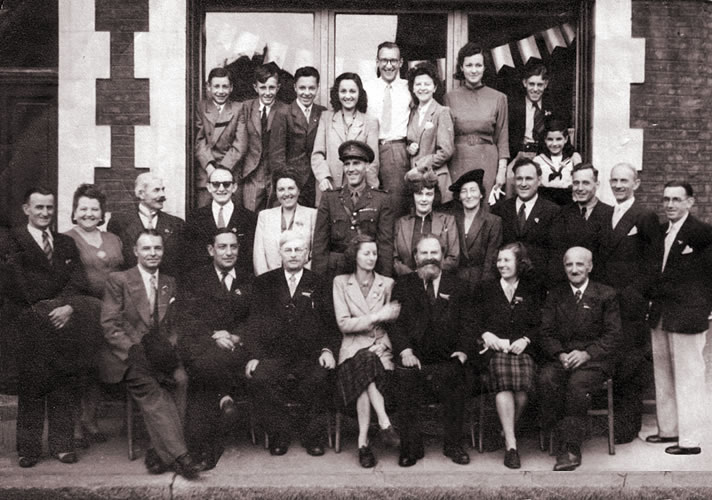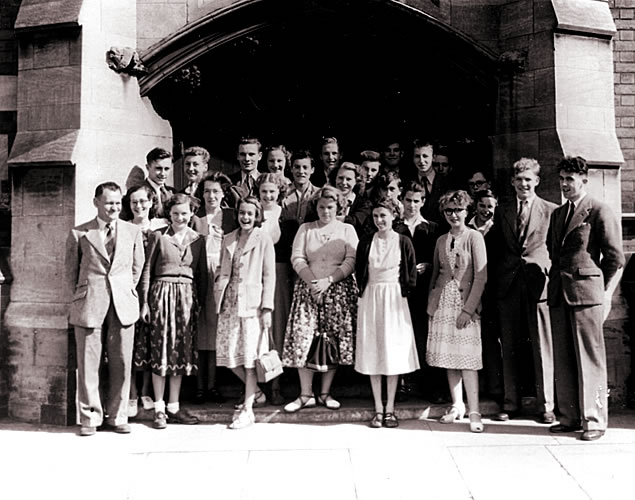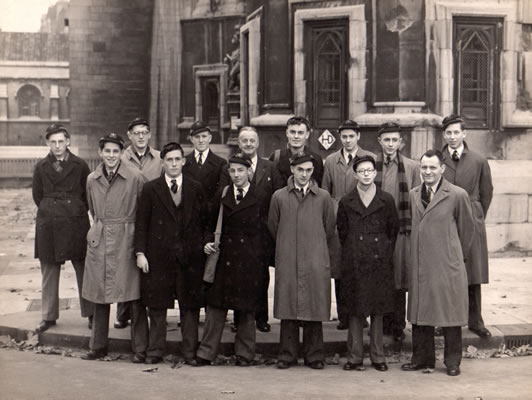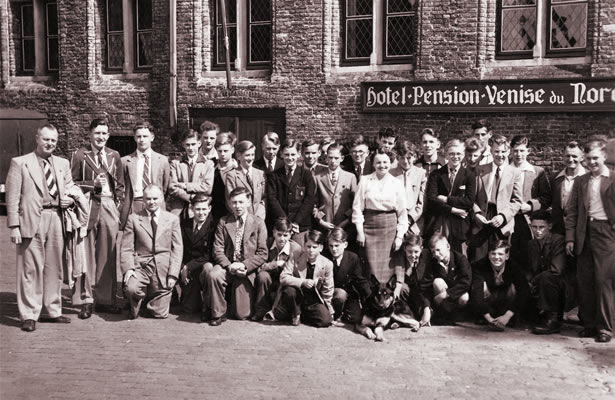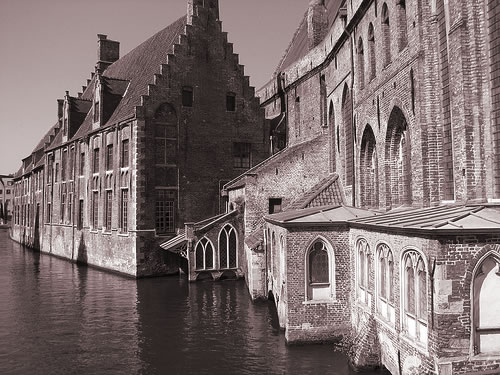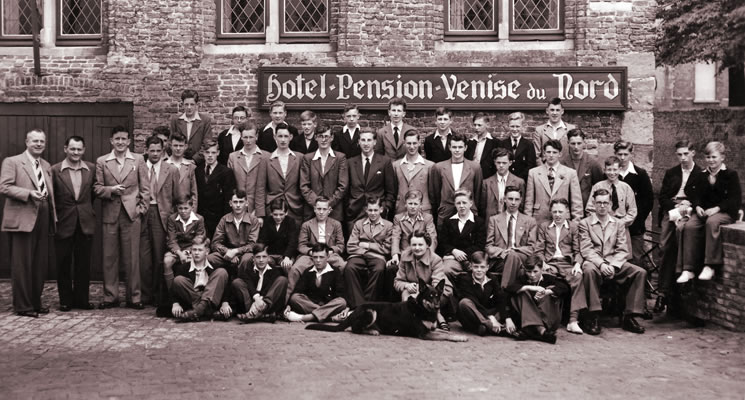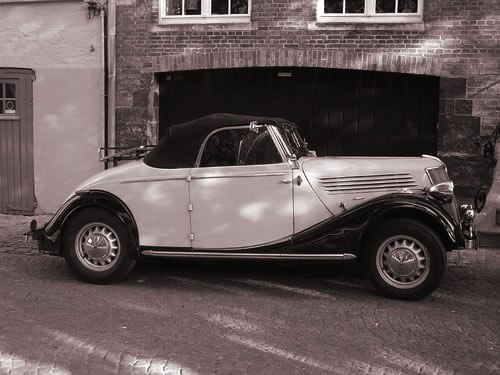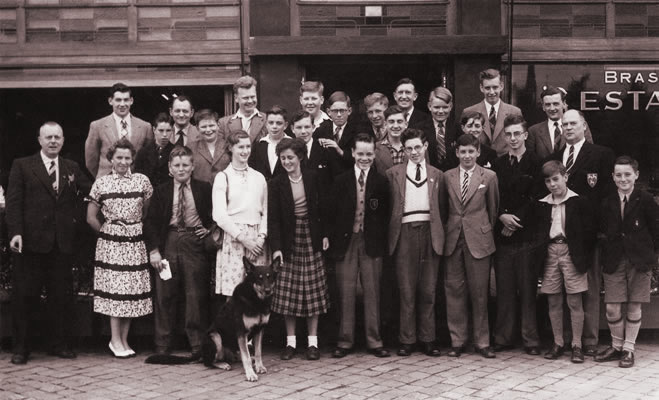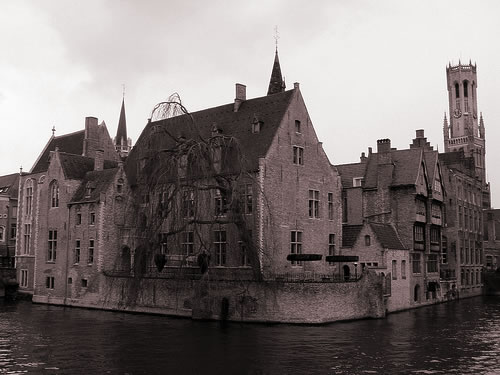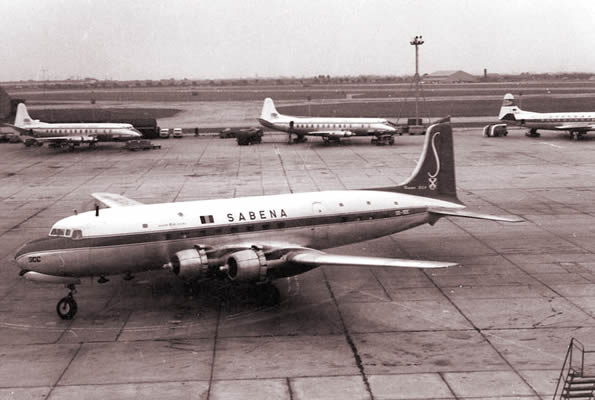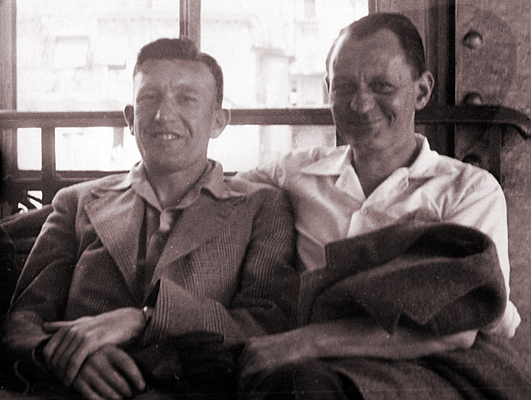1960 – Luxembourg Trip
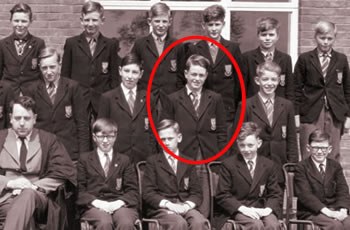 An Account by P. Cartwright:
An Account by P. Cartwright:
The party, which was led by Mr Ellick (Ernie) Ward the French teacher, consisted of boys from the Senior section of the school and one boy from the Technical High School; there were eighteen of us altogether.
Our coach to take us to London left from Burton Town Hall at 4:45am on the Thursday morning after we had broken up for the summer holidays. The 10:00am boat train from London’s Victoria Station took us to Dover where we caught the 11:00am boat to Ostend, Belgium. The channel crossing was calm and we arrived in Ostend three hours later in bright sunshine, welcomed to the Continent but reminded of England and Burton by a large advertisement for ‘Bass Beer’ on the harbour.
We spent our first night in Brussels, where we arrived at 5:30pm by express train direct from Ostend. The city has a well used tramcar service and the small single-decker tramcars travel underground as well as on the streets,many of which are not tarmaced but instead surfaced with small square slabs of concrete. We stayed the night at the Flemish Youth Hostel, an old country building which had been restored and we were somewhat discouraged by both the accommodation and the food. Fortunately, this hostel turned out to be the worst one we stayed in.
 At 8:30pm the next morning, we set out for the train station to catch a direct express to Luxembourg City. The train passed through the hilly, wooded countryside characteristic of Southern Belgium and Luxembourg. We arrived in Luxembourg City, the capital of the Grand Duchy, at 12:30pm and, after lunch, we walked round the old city of tall buildings until after four o’clock, when we caught the auto-rail to Ettelbruck, 25 Km north on the river Shzette. We stayed the night at the Youth Hostel here and next morning, caught the auto-rail to Goebelsmuhle. From here, we walked in the pouring rain across wooded countryside to the small village of Kautenback and on to the town of Wiltz, this time along the road because of the very wet conditions; a distance of 17 Km in all.
At 8:30pm the next morning, we set out for the train station to catch a direct express to Luxembourg City. The train passed through the hilly, wooded countryside characteristic of Southern Belgium and Luxembourg. We arrived in Luxembourg City, the capital of the Grand Duchy, at 12:30pm and, after lunch, we walked round the old city of tall buildings until after four o’clock, when we caught the auto-rail to Ettelbruck, 25 Km north on the river Shzette. We stayed the night at the Youth Hostel here and next morning, caught the auto-rail to Goebelsmuhle. From here, we walked in the pouring rain across wooded countryside to the small village of Kautenback and on to the town of Wiltz, this time along the road because of the very wet conditions; a distance of 17 Km in all.
Soon after we arrived, the rain stopped and the sun shone for the rest of the day to raise spirits. Among the attractions at Wiltz was an Operatic Festival and an American tank which stood as a relic of the Second World War.
We left Wiltz the next morning, again in bright sunshine and headed on foot for Clervaux in the north. The weather and scenery were magnificent and, after stopping on the way to have refreshments and the usual mid-day meal of bread and jam, we arrived at Clervaux, a quaint old town in the bottom of a deep valley cut by the river Clerf. With its pointed roofs, a castle and a monastery, the town felt like one straight out of a fairy tale.
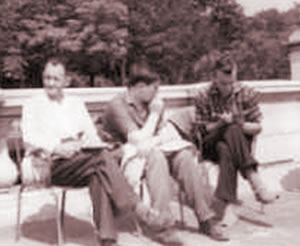 The next day, it was raining again so, instead of walking, we caight the auto-rail to Ettelbruck where, because of the weather, we hardly did anything until 5:30pm when we caught the train to Diekirch, ‘The Burton-on-Trent of Luxembourg’. We travelled by bus from Diekirch to Vianden where we stayed for the following two nights, again, in a Youth Hostel. Vianden is on the eastern border of Luxembourg, bordering with Germany and catered for tourists. The town is situated in yet another deep valley where a river had cut deep into the surrounding wooded country which seemed to characterize Luxembourg, and a chair-lift passes from the town, across the river and up to a chalet on the mountainside. At the top of the mountain was a 13th century castle overlooking the town. We could see a scheme in progress for damming up the valley to provide power or a supply of water.
The next day, it was raining again so, instead of walking, we caight the auto-rail to Ettelbruck where, because of the weather, we hardly did anything until 5:30pm when we caught the train to Diekirch, ‘The Burton-on-Trent of Luxembourg’. We travelled by bus from Diekirch to Vianden where we stayed for the following two nights, again, in a Youth Hostel. Vianden is on the eastern border of Luxembourg, bordering with Germany and catered for tourists. The town is situated in yet another deep valley where a river had cut deep into the surrounding wooded country which seemed to characterize Luxembourg, and a chair-lift passes from the town, across the river and up to a chalet on the mountainside. At the top of the mountain was a 13th century castle overlooking the town. We could see a scheme in progress for damming up the valley to provide power or a supply of water.
After staying two nights at Vianden, we hiked to Beaufort to the south-east, a town with a another 13th century castle. Having spent a night at Beaufort Youth Hostel, we set out in more pouring rain for Echternach. Our route was through some soaked woodland but a spectacle worth seeing was the ‘seven sisters’; seven deep gorges or narrow faults in solid rock, each only a few feet wide. It was still raining when we arrived at Echternach, which is the second largest town in Luxemburg. It had an ancient Basilica and a very modern Youth Hostel where we spent our final night in Luxemburg.
From Echternach, we travelled by bus the next day back to Luxembourg City where we caught the train to Brussels. From Brussels, we travelled to Bruges. Bruges had long been a favourite destination for Burton Grammar School trips being a much visited tourist centre as one of the most important commercial cities in Europe during the 13th and 14th centuries. We marvelled at the buildings, monuments, churches, palaces and bridges with its network of canals which connected up with the wide sea canal to Zeebrugge. We also saw the white statue of Madonna by Michelangelo in the ‘Church of Our Lady’. The new Youth Hostel at Bruges was plagued with mosquitoes resulting in many bites but nothing stopped us having an enjoyable time. Back the same way as we came through Ostend, Dover and London, we finally returned to Burton on July 31st.


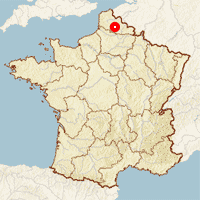 During 1945, with a strong post-war enthusiasm for re-establishing friendly connections in Europe, recently joined Hugh Wood in collaboration with the ‘Alliance Francaise’ formed a branch of ‘Le Cercle Francais’.
During 1945, with a strong post-war enthusiasm for re-establishing friendly connections in Europe, recently joined Hugh Wood in collaboration with the ‘Alliance Francaise’ formed a branch of ‘Le Cercle Francais’.